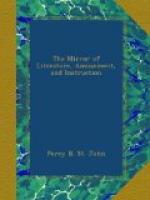THE MIRROR OF LITERATURE, AMUSEMENT, AND INSTRUCTION.
Vol. XIV, No. 384.] Saturday, August 8, 1829. [Price 2d.
* * * * *
Voltaire’s Chateau, at Ferney.
[Illustration]
Voltaire is the bronze and plaster poet of France. Cheek by jowl with Rosseau, (their squabbles are forgotten in the roll of fame), you see him perched on mantel, bracket, ecritoire, and bookcase: in short, their effigies are as common as the plaster figures of Shakspeare and Milton are in England. How far the rising generation of France may profit by their household memorials—or the sardonic and satanic smile of their great poet—we will not pretend to determine; neither do we invite any comparison; although Voltaire, with all his trickseyings and panting after fame, never inculcated so sublime a lesson as is conveyed in
“The cloud-capp’d towers,” &c.
which are inscribed beneath the bust of our immortal bard.
But we turn from Voltaire and his stormy times to the seat of his retirement—Ferney, about six miles from Geneva; where he lived for twenty years; but in his eighty-fourth year actually quitted this scene of delightful repose for the city of Paris—there to enjoy a short triumph, and die. The latter event took place in 1778. At pages 62 and 69 of vol. xii. of the mirror, we have given a brief description of Ferney, with many interesting anecdotes, carefully compiled from a variety of authorities. Here Voltaire lived in princely style, as Condorcet says, “removed from illusion, and whatever could excite momentary, or personal passion.” According to M. Simond, a recent tourist, the chateau is still visited by travellers, and Voltaire’s bed-room is shown in the state he left it. The date of our view is about the year 1800, since which the residence has been much neglected: and during the late war, it was frequently the quarters of the Austrian soldiers. The gardens are laid out in the formal, geometrical style, and they command a view of the town and lake of Geneva. The apartments of the ground-floor of the house are in the same state as during Voltaire’s lifetime. In the dining-hall is a picture, representing demons horsewhipping Freron:[1] such was Voltaire’s mode of perpetuating his antagonists.
[Footnote 1: Freron was an eminent journalist of the last century: his criticisms procured him many powerful enemies, among whom was Voltaire.]
Of the purchase of Ferney, Voltaire thus speaks in his memoirs:—




